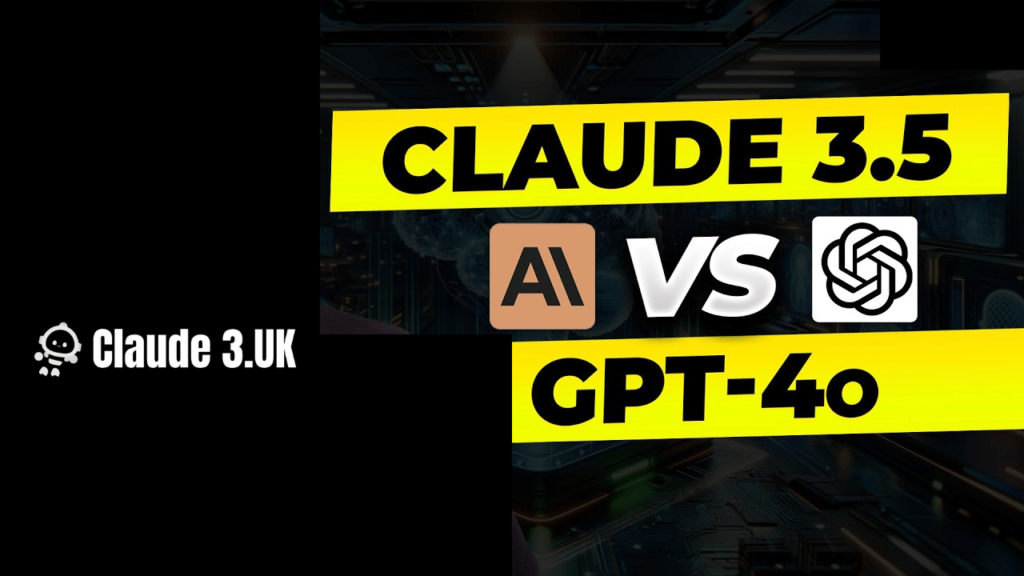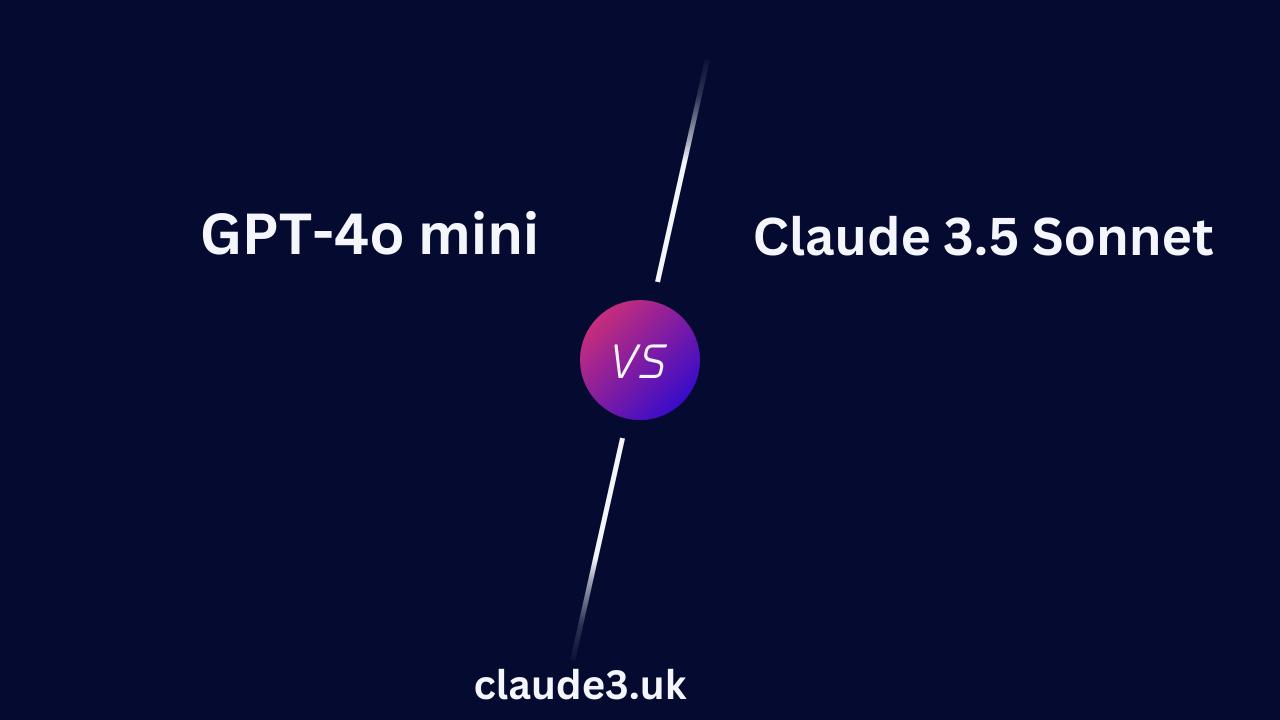Artificial Intelligence (AI) is rapidly advancing, with language models at the forefront of this technological revolution. Two of the most prominent AI models today are GPT-4o Mini and Claude 3.5 Sonnet. Both models offer impressive capabilities and features, but which one truly stands out as the real AI boss?
This article provides a detailed comparison of GPT-4o Mini and Claude 3.5 Sonnet, examining their strengths, weaknesses, and unique features across various aspects.
1. Model Architecture and Design
Understanding the underlying architecture and design of these models is crucial in assessing their capabilities.
GPT-4o Mini:
- Architecture: GPT-4o Mini is based on the transformer architecture, which has been highly effective for natural language processing (NLP). It utilizes numerous layers and attention heads to process and generate human-like text.
- Size and Efficiency: Despite being a “mini” version, GPT-4o Mini contains billions of parameters. Its design is optimized for efficiency, balancing performance and resource usage to make it accessible for various applications.
Claude 3.5 Sonnet:
- Architecture: Claude 3.5 Sonnet also employs a transformer-based architecture but includes enhancements for better performance and contextual understanding. These improvements focus on maintaining conversational coherence and understanding complex inputs.
- Scalability: Claude 3.5 Sonnet is designed for scalability, enabling it to operate efficiently across different platforms, from mobile devices to large data centers. Its modular design allows for easy updates and customization.
Conclusion: Both models leverage the powerful transformer architecture, but Claude 3.5 Sonnet’s design enhancements and scalability give it an edge in adaptability and performance.
2. Natural Language Understanding and Generation
The core function of any language model is its ability to understand and generate text. Let’s compare the two models in this regard.
GPT-4o Mini:
- Understanding: GPT-4o Mini has a robust natural language understanding capability, allowing it to interpret a wide range of inputs accurately. It excels in parsing complex sentences and understanding the nuances of human language.
- Generation: The model generates coherent and contextually relevant text, making it suitable for various applications, from chatbots to content creation. Its responses are typically well-structured and fluent.
Claude 3.5 Sonnet:
- Understanding: Claude 3.5 Sonnet takes natural language understanding a step further with advanced contextual awareness. It can maintain coherence over long conversations and handle intricate queries with ease.
- Generation: Claude 3.5 Sonnet’s text generation is dynamic and adaptable, capable of adjusting tone and style based on user preferences. Its ability to generate empathetic and contextually appropriate responses sets it apart.
Conclusion: While both models excel in understanding and generating text, Claude 3.5 Sonnet’s advanced contextual awareness and adaptive generation provide a more personalized and coherent interaction experience.
3. Conversational Abilities
Effective conversational abilities are crucial for AI models used in customer support, personal assistants, and interactive applications.
GPT-4o Mini:
- Coherence: GPT-4o Mini maintains a good level of coherence in conversations, especially in short to medium-length interactions. It can follow the context and respond appropriately.
- Adaptability: The model is reasonably adaptable, capable of handling various conversation topics and styles. However, its adaptability might be limited in highly dynamic or prolonged interactions.
Claude 3.5 Sonnet:
- Coherence: Claude 3.5 Sonnet excels in maintaining conversational coherence, even over long interactions. Its ability to remember and refer back to earlier parts of the conversation enhances the user experience.
- Adaptability: The model is highly adaptable, with dynamic response generation that can adjust based on the conversation flow. Its emotional intelligence further enhances its conversational abilities, allowing it to respond empathetically.
Conclusion: Claude 3.5 Sonnet’s superior coherence and adaptability make it a better choice for applications requiring sustained and dynamic interactions.
4. Multimodal Capabilities
Multimodal capabilities refer to an AI’s ability to process and generate not just text but also other forms of media such as images, audio, and video.
GPT-4o Mini:
- Text: Primarily focuses on text processing and generation. It excels in tasks related to textual data, such as content creation, summarization, and language translation.
- Limited Multimodal: While it has some capabilities to process and understand images through additional modules, its primary strength remains in text-based tasks.
Claude 3.5 Sonnet:
- Text: Excels in text processing and generation with advanced features for natural language understanding.
- True Multimodal: Claude 3.5 Sonnet is designed to handle multimodal inputs, including images, audio, and video. It can analyze, describe, and generate multimedia content, making it highly versatile.
Conclusion: Claude 3.5 Sonnet’s true multimodal capabilities provide a significant advantage, enabling it to process and generate a wide range of media types, which GPT-4o Mini lacks.
5. Personalization and User Adaptation
Personalization is a key aspect of creating user-centric experiences, and both models offer features to tailor interactions.
GPT-4o Mini:
- Basic Personalization: Offers basic personalization features, allowing for some degree of customization based on user inputs and preferences. It can adjust responses to some extent but lacks deep personalization capabilities.
- Developer Customization: Provides APIs that developers can use to integrate and customize the model for specific applications. However, customization options might be limited compared to more advanced models.
Claude 3.5 Sonnet:
- Advanced Personalization: Excels in personalization, with detailed user profiling and adaptive learning capabilities. The model learns from interactions to continuously improve and tailor responses to individual users.
- Extensive Customization: Offers extensive customization options for developers, including custom training and response style adjustments. This makes it highly flexible and suitable for various specialized applications.
Conclusion: Claude 3.5 Sonnet’s advanced personalization and extensive customization capabilities make it a more effective and enjoyable tool for users across different contexts and applications.
6. Security and Privacy
In an age where data security and privacy are paramount, the handling of user data by AI models is critically important.
GPT-4o Mini:
- Standard Security: Implements standard security measures, including encryption and access controls, to protect user data. It ensures compliance with general data protection regulations.
- Privacy Considerations: Provides basic privacy features, but may not have advanced mechanisms for anonymization or consent management.
Claude 3.5 Sonnet:
- Enhanced Security: Incorporates advanced security features, including end-to-end encryption and robust access controls. It is designed to meet high-security standards required by various industries.
- Privacy-First Approach: Emphasizes user privacy with advanced data anonymization techniques and comprehensive consent management tools. Users have greater control over their data and how it is used.
7. Integration and Deployment
Ease of integration and deployment is crucial for the practical application of AI models in real-world scenarios.
GPT-4o Mini:
- Integration: Provides APIs and SDKs that facilitate integration with various platforms and applications. However, the integration process might require significant technical expertise.
- Deployment: Primarily designed for cloud deployment, making it suitable for scalable applications. Local deployment options are available but may be less optimized.
Claude 3.5 Sonnet:
- Seamless Integration: Offers comprehensive APIs, SDKs, and detailed documentation, making integration with existing systems straightforward. It supports a wide range of platforms, including mobile and web applications.
- Flexible Deployment: Supports both cloud and edge deployment, allowing for flexible and resource-efficient use. This versatility ensures optimal performance in different environments.
Conclusion: Claude 3.5 Sonnet’s seamless integration and flexible deployment options provide a significant advantage for developers and organizations looking to implement AI solutions.
8. Cost and Accessibility
Cost and accessibility are critical factors, especially for small and medium-sized enterprises looking to leverage AI technology.
GPT-4o Mini:
- Cost: Generally more cost-effective, making it accessible to a broader range of users and businesses. It offers various pricing plans to cater to different needs and budgets.
- Accessibility: Easily accessible through various platforms, with straightforward pricing models that make it an attractive option for smaller projects and startups.
Claude 3.5 Sonnet:
- Cost: May have a higher initial cost due to its advanced features and capabilities. However, the long-term benefits of enhanced performance and versatility may justify the investment.
- Accessibility: Accessible to a wide range of users, with flexible pricing plans and deployment options. It is designed to cater to both small and large-scale applications, ensuring broad usability.
Conclusion: GPT-4o Mini’s cost-effectiveness and accessibility make it a more attractive option for budget-conscious users, while Claude 3.5 Sonnet’s advanced features may justify the higher cost for more demanding applications.
9. Community and Support
The support and community around an AI model can significantly impact its usability and continuous improvement.
GPT-4o Mini:
- Community: Backed by a large and active community of developers and researchers. This community-driven support fosters continuous improvement and provides ample resources for troubleshooting and development.
- Support: Offers robust customer support with various channels for assistance, including forums, documentation, and direct support services.
Claude 3.5 Sonnet:
- Community: Also has a strong community of users and developers, with a focus on collaborative improvement and innovation. The community is engaged in sharing best practices and developing new applications.
- Support: Provides comprehensive support, including detailed documentation, tutorials, and direct support channels. The model also benefits from a network of experts who contribute to its continuous enhancement.
Conclusion: Both models benefit from strong community and support networks, but the extensive community-driven support of GPT-4o Mini provides a slight edge in terms of collaborative development and resource availability.

10. Future Prospects and Innovation
The future potential of these models is a crucial factor in determining their long-term viability and relevance.
GPT-4o Mini:
- Innovation: Continuously evolving with regular updates and improvements. The model’s development is driven by an active research community focused on pushing the boundaries of natural language processing.
- Prospects: Promising future prospects with plans for incorporating more advanced features and capabilities. The model’s adaptability and broad user base ensure its ongoing relevance.
Claude 3.5 Sonnet:
- Innovation: Leading in innovation with cutting-edge enhancements and features. The model’s focus on multimodal capabilities and advanced personalization positions it at the forefront of AI development.
- Prospects: Bright future with continuous advancements and updates. Claude 3.5 Sonnet’s commitment to integrating the latest AI research and technologies ensures its place as a top-tier language model.
Conclusion: Both models have promising futures with ongoing innovations. Claude 3.5 Sonnet’s focus on cutting-edge features and multimodal capabilities positions it as a leader in the AI landscape, while GPT-4o Mini’s adaptability and community support ensure its continued relevance and evolution.
Final Verdict
Both GPT-4o Mini and Claude 3.5 Sonnet are exceptional AI models, each with unique strengths and capabilities. GPT-4o Mini is an excellent choice for cost-effective, efficient text-based applications with robust community support. Claude 3.5 Sonnet, on the other hand, offers advanced contextual understanding, multimodal capabilities, and superior personalization, making it ideal for more complex and dynamic applications.
Ultimately, the choice between GPT-4o Mini and Claude 3.5 Sonnet depends on the specific needs and priorities of the user or organization. For those seeking a versatile, cost-effective solution, GPT-4o Mini is a strong contender. For applications requiring advanced features, enhanced security, and a focus on user personalization, Claude 3.5 Sonnet stands out as the real AI boss.
FAQs
What are the main differences in architecture between GPT-4o Mini and Claude 3.5 Sonnet?
GPT-4o Mini and Claude 3.5 Sonnet both use transformer architectures, but Claude 3.5 Sonnet includes enhancements for improved contextual understanding and scalability, while GPT-4o Mini focuses on efficiency and accessibility.
Which model has better natural language understanding and generation capabilities?
Both models excel in natural language understanding and generation, but Claude 3.5 Sonnet has advanced contextual awareness and adaptive generation, providing more personalized and coherent interactions.
How do the personalization features differ between the two models?
Claude 3.5 Sonnet offers advanced personalization with detailed user profiling and adaptive learning, while GPT-4o Mini provides basic personalization and customization through APIs.
Which model is easier to integrate and deploy?
Claude 3.5 Sonnet provides seamless integration with comprehensive APIs and flexible deployment options (cloud and edge), making it more versatile than GPT-4o Mini, which is optimized for cloud deployment.
Which model has better community and support resources?
GPT-4o Mini is supported by a large, active community of developers and researchers, fostering continuous improvement, while Claude 3.5 Sonnet also offers robust support with detailed documentation and developer resources.
